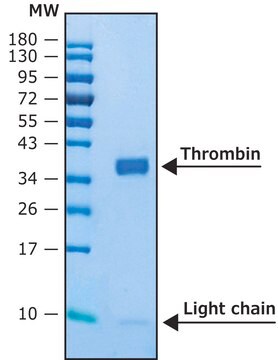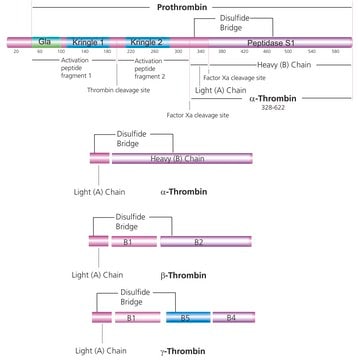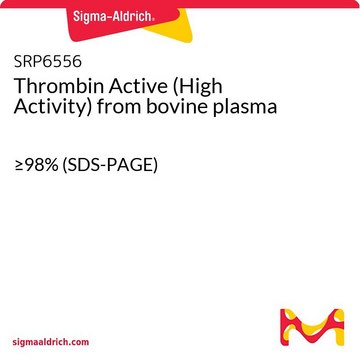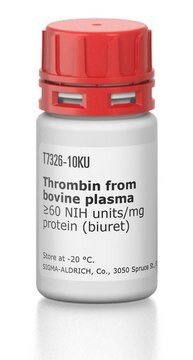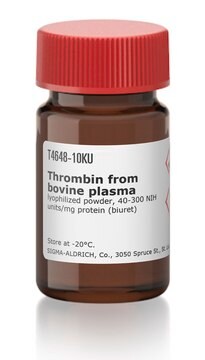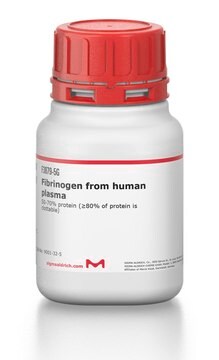SRP6557
Thrombin Active from human plasma
≥95% (SDS-PAGE), recombinant, lyophilized
Sinónimos:
Activated Factor IIa
Iniciar sesiónpara Ver la Fijación de precios por contrato y de la organización
About This Item
UNSPSC Code:
12352202
NACRES:
NA.32
Productos recomendados
General description
Thrombin enzyme (activated factor IIa) is an important clotting promoter that controls the transformation of soluble fibrinogen to insoluble active fibrin strands. Thrombin is a coagulation protein and a serine protease (EC 3.4.21.5) that catalyzes many coagulation-related reactions. It is primarily associated with blood clotting.
Biochem/physiol Actions
Thrombin triggers factor-XI, factor-V, Factor-XIII and factor-VIII. Thrombin endorses platelet activation, using activation of protease-activated receptors on the platelet. It also induces inflammation. As a result of its high proteolytic specificity, thrombin has become an important biochemical protein. The thrombin cleavage site (Leu-Val-Pro-Arg-Gly-Ser) is widely used in linker regions of recombinant fusion protein constructs. After the purification of the fusion protein, thrombin is used to cleave between the Arginine and Glycine residues of the cleavage site, efficiently removing the purification tag from the protein of interest with a high degree of specificity.
Physical form
Lyophilized from a buffer composed of 20 mM Bis-Tris, 150 mM NaCl and 0.1% PEG 8000, pH 6.5.
Reconstitution
A working stock solution can be prepared by adding 1 mL buffered saline, pH 7.4 (ex. 25 mM HEPES, 150 mM NaCl, 0.1% PEG 8000, pH 7.4). Further dilution should be made in buffer containing a suitable stabilizing agent such as 0.1%-1% Prionex, BSA, or PEG.
Disclaimer
RESEARCH USE ONLY. This product is regulated in France when intended to be used for scientific purposes, including for import and export activities (Article L 1211-1 paragraph 2 of the Public Health Code). The purchaser (i.e. enduser) is required to obtain an import authorization from the France Ministry of Research referred in the Article L1245-5-1 II. of Public Health Code. By ordering this product, you are confirming that you have obtained the proper import authorization.
signalword
Danger
hcodes
Hazard Classifications
Eye Irrit. 2 - Resp. Sens. 1
Storage Class
11 - Combustible Solids
wgk_germany
WGK 3
Certificados de análisis (COA)
Busque Certificados de análisis (COA) introduciendo el número de lote del producto. Los números de lote se encuentran en la etiqueta del producto después de las palabras «Lot» o «Batch»
¿Ya tiene este producto?
Encuentre la documentación para los productos que ha comprado recientemente en la Biblioteca de documentos.
Los clientes también vieron
Exogenous thrombin delivery promotes collateral capillary arterialization and tissue reperfusion in the murine spinotrapezius muscle ischemia model.
Bruce AC and Peirce SM
Microcirculation (New York, N.Y. : 1994), 19(2), 143-154 (2012)
Tobias Strittmatter et al.
Nature chemical biology, 18(10), 1125-1134 (2022-08-09)
Cellular therapies remain constrained by the limited availability of sensors for disease markers. Here we present an integrated target-to-receptor pipeline for constructing a customizable advanced modular bispecific extracellular receptor (AMBER) that combines our generalized extracellular molecule sensor (GEMS) system with
Structure of the thrombin complex with triabin, a lipocalin-like exosite-binding inhibitor derived from a triatomine bug.
Fuentes-Prior P
Proceedings of the National Academy of Sciences of the USA, 94(22), 11845-11850 (1997)
Hadar Peeri et al.
Cancers, 13(7) (2021-05-01)
Glioblastoma multiforme (GBM) is the most lethal subtype of glioma. Cannabis sativa is used for the treatment of various medical conditions. Around 150 phytocannabinoids have been identified in C. sativa, among them Δ-9-tetrahydrocannabinol (THC) and cannabidiol (CBD) that trigger GBM
Nuestro equipo de científicos tiene experiencia en todas las áreas de investigación: Ciencias de la vida, Ciencia de los materiales, Síntesis química, Cromatografía, Analítica y muchas otras.
Póngase en contacto con el Servicio técnico